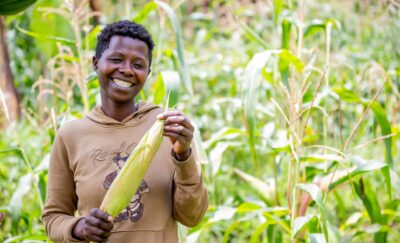News
12 January 2011
Forest communities in Tanzania make great progress in 2010 and will reap the rewards in 2011
Over the course of 2010, Farm Africa worked with 39 groups (585 farmers) in 13 villages in Tanzania to identify three new income-generating activities that could be trialled by each village. These activities can reduce farmers’ reliance on chopping down trees to earn a living and help them to earn a higher income and protect the forest at the same time. The farmers worked with Farm Africa and the local government to conduct a detailed assessment of the alternative livelihoods available and to decide which would be the most suitable activities for each village.
After completing the assessments, the activities being trialled range from ecotourism to mushroom farming. Ecotourism was selected by six groups to be tested as an alterative livelihood. Last year farmers, together with local government, conducted a survey to identify attractive sites in the area such as waterfalls and nature trails. This year, these farmers will be trained in ecotourism and will also be linked to tourist operatives working in the area.
In 2010, thirteen groups were trained in mushroom farming – a livelihood that both increases farmers’ income and also helps them to produce more food to feed their families. Every mushroom farmers’ group established a demonstration plot to trial mushroom farming. At the end of 2010, seven groups had already harvested mushrooms. Mushroom farming has the potential to generate an income of £200 a year – which is a 50% increase in household income after packing the mushrooms and selling them at market.
One group in Mongahay village is trialling fish farming which will allow farmers to supplement their income. 1n 2010 the group received training in fish farming techniques such as digging ponds, types of fish food and identifying different types of fish to be farmed. By the end of 2010, 470 fertilised fish eggs had been introduced to the ponds and they will be harvested in six months’ time.
Over the course of this year, these 585 farmers will put their training into practice and start to earn an income from the activities they have trialled. If the activities prove successful, farmers will have found a way to improve their income without cutting down trees for charcoal or to sell as firewood. They will have found a sustainable way to make the most of the forests’ resources around them.




